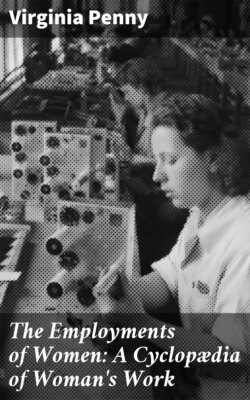Читать книгу The Employments of Women: A Cyclopædia of Woman's Work - Virginia Penny - Страница 11
На сайте Литреса книга снята с продажи.
4. Bankers and Bankers' Clerks.
ОглавлениеTable of Contents
Before the existence of savings banks, the poor had no safe place of deposit, where they could receive interest, and whence they could withdraw their deposits at pleasure. If they loaned their money, there was no certainty of recovering it. If they tried to accumulate by saving what they had, it was not always secure from depredation. Consequently they were tempted to spend any surplus money they had, and often no forethought of the future could save them from anxiety and misery. Now, by industry and perseverance, they are enabled to accumulate something for contingencies—to provide against want, sickness, old age, and slackness of employment. The idea of a savings bank was originated by a woman—Mrs. Priscilla Wakefield. It is a most worthy institution, and deserving of support and patronage. Holding office in a bank is a very responsible situation. The numerous men defaulters that have disgraced themselves in the last few years, are sufficient proof that the temptation to appropriate unjustly is very great. It requires men and women of fixed principle, whose honor is dearer to them than life itself. We think women could very well manage savings banks. They could at any rate attend in the female department, and in some parts of Europe do. We find in the census of Great Britain two female bankers reported. In the Englishwoman's Journal we read: "At St. Malo, a few years ago, the wife of a rich banker, during his absence, took her place at his desk amid the numerous clerks, received checks, and gave to the writer of this article French money in return. They are frequently found in offices, and often mainly conduct a husband's or a father's business." One of the Mrs. Rothschild, I have been told, even now spends two or three hours every day in her husband's banking house. Mrs. Mary Somerville says: "Three of the most beneficial systems of modern times are due to the benevolence of English ladies—the improvement of prison discipline, savings banks, and banks for lending small sums to the poor." Not many years ago a banking house was conducted by a lady in Nashville, Tenn. She was a widow, but had during her first husband's life attended to some of the duties of the bank, and accompanied her husband when he visited New York on business. She is now the wife of one of the late candidates for the highest office in this nation—that of chief magistrate. A lady was employed in a savings bank in Boston a few years back. A gentleman who has been cashier in a bank for many years writes me: "I have no doubt that women might be qualified for bank and brokers' clerks as well as men. In the offices of cashier and teller, they would have to come in contact with so many rough characters, I doubt whether it would do. I do not know the salaries paid in Europe, either in stores, shops, banks, or brokers' offices, but suppose it varies as it does in this country, according to the size of the city, the bank or broker's capital, the qualifications and character, and the situations the persons occupy. The cashier receives more than the teller; the teller often more than the clerk, and the clerks are graded. In large banks in the city of New York, the cashiers get from $4,000 to $6,000 per annum, while in the country banks they scarcely get half that amount. In the city their situations are very laborious, and very responsible, and many of them have been twenty-five or thirty years in the business before they got to be cashiers. Tellers receive in large cities from $2,500 to $3,000, and in small places from $1,200 to $2,000. Clerks get in New York banks from $600 to $3,000, taking the whole range from boys of seventeen to men of sixty with families and great experience. In smaller towns they receive from $300 to $2,500, taking the same range, many of them getting not more than $1,500 at any time during their lives. In stores and shops the salaries are much less, say not much over one half in very many instances; but persons in stores and shops have this advantage over bank clerks: when they learn the business, they are often taken into partnership with the proprietor, or they may set up in a similar business for themselves. But bank clerks have no such prospects before them. There may be salaries, in a few instances, over those mentioned, but very seldom; and on the other hand, some young men are placed in business sometimes without any remuneration for the first year. I would also state that the situation of bank clerk, although very much sought for, is certainly not desirable, as $1,200 or $1,500 will not support a family in any city of the United States, without the most rigid economy; and then they have little or nothing to lay up for a rainy day. Many bank clerks in this city are no better off now than they were twenty years ago, though they have lived poorly and economized all the time. So, in some respects, the store clerk or salesman has the advantage. One reason why young men prefer becoming bank clerks to mercantile clerks is, that they have more time for themselves. Say, they commence by seven o'clock in a store, and nine at bank; they get through by two or three o'clock in bank, and they have to work until night in a store.'
